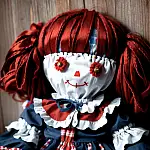Witches, Witchcraft and Sorcery - Origins, Practices and MythsWhat is witchcraft? We take a look at Witchcraft through history, the origins, practices and customs, witch hunts and trials.
A witch (from the Old English masculine wicca, feminine wicce) is a practitioner of witchcraft. The term witch can be used as masculine or feminine, although the majority of historically accused were women, and legends and popular culture portray it as a female stereotype.
The term Witchcraft comes from the Old English word wiccecræft, meaning sorcery or necromancy. In historical, religious and mythological contexts, is the use of certain kinds of supernatural or magical powers. Historically witchcraft has come to mean somebody who can influence another person's mind, body or property against his or her will, or which is believed, by the person doing the labelling, to undermine the social or religious order. Sorcery is a very closely related subject to witchcraft and is stereotypically male-dominant.
Witchcraft and Sorcery are both ancient in origin and feature heavily in religion, especially Christianity, but date back as far as ancient Egypt and Babylonia. Almost all of the major religions view witchcraft and sorcery as "devil worship", some Christians actively condemn any form of magic as satanic, believing that witchcraft derives its power from forces of evil (contrary to the teachings of Wicca), while others do not or simply dismiss it as superstition.
Difference between Black and White Magic
References to the term "Magic" in this article do not relate to the "stage magic" of magicians such as Paul Daniels, David Blaine and so on. Stage magic is an illusion. In this article, Magic refers to a conceptual system that asserts the human ability to control the natural world (including events, objects, people, and physical phenomena) through mystical, paranormal or supernatural means.
Possibly because of the links with devil worship, Wicca and Witchcraft often refer to differences in magic as Black Magic and White Magic.
Black Magic (also spelt magick to separate from white magic) is used to identify practices that originate from devil worship or Satanism and is used to kill, injure, or cause destruction, or for personal gain. Black Magick (also dark magick, dark side and dark arts) practices include necromancy (conjuring the spirits of the dead), Left-hand path, Voodoo and so on.
White Magic, as practised by Wiccans, originates from nature and is used to heal, for protection and combat black magic. Because of the hysteria concerning Witchcraft, many Wiccans continue the traditional practice of secrecy, concealing their faith for fear of persecution, although they are completely separate from the black magic practices.
History and Religion of Witchcraft
The belief in witchcraft and its practice are widespread throughout the ancient world, both in ancient Egypt and in Babylonia it played a conspicuous part in history. This quote from the Code of Hammurabi from around 2000 BC, talks of the law governing unjustified spells:
If a man has put a spell upon another man and it is not justified, he upon whom the spell is laid shall go to the holy river; into the holy river shall he plunge. If the holy river overcomes him and he is drowned, the man who put the spell upon him shall take possession of his house. If the holy river declares him innocent and he remains unharmed the man who laid the spell shall be put to death. He that plunged into the river shall take possession of the house of him who laid the spell upon him.
The Hebrew Bible has numerous references to witchcraft, the most powerful verse:
Thou shalt not suffer a witch to live.Exodus 22:18
is believed to have provided scriptural justification for Christian witch hunters in early modern times. The New Testament references sorcerers and sorcery rather than the Hebrew witch and witchcraft. The word witch is a translation of the Hebrew kashaph, "sorceress".
Jewish law views the practice of witchcraft as being laden with idolatry and necromancy; both being serious theological and practical offences in Judaism.
Magic in Islam encompasses a wide range of practices, including black magic, warding off the evil eye, the production of amulets and other magical equipment, conjuring, casting lots, astrology and physiognomy. Muslims commonly believe in magic (Sihr) and explicitly forbid its practice.
Witch Hunts and Witchcraft Trials

In the early modern era (1450 to 1700) mass hysteria over witchcraft prompted the witch hunt, a search for witches or evidence of witchcraft which resulted in tens of thousands of executions. The most famous witch hunt was probably the Salem Witch Trials of 1692 where nineteen men and women were sent to Gallows Hill near Salem Village, for hanging. Four other people died in jail, while hundreds of other suspected witchcraft practitioners were imprisoned without trial.
Most of the accused witches lived in southern Salem and were generally better off financially than most of the accusers. In several cases, accused families stood to gain property from the convictions of accused witches. Also, the accused and the accusers generally took opposite sides in a congregational schism that had split the Salem community before the outbreak of hysteria. The conclusion that many scholars draw from this, and other patterns, is that property disputes and congregational feuds played a major role in determining who lived, and who died, in 1692.
A period of atonement began in the colony following the release of the surviving accused witches. Samuel Sewall, one of the judges, issued a public confession of guilt and an apology. Several jurors came forward to say that they were "sadly deluded and mistaken" in their judgements.
Scottish Witch Hunt of 1661-1662
Before Salem however, was the Scottish witch hunt of 1661-1662. During this time, Scotland held one of the largest witch hunts in European history, in which an estimated 600 people were accused of witchcraft or ritually summoning the devil. The hunt began in Lothian, Scotland, for unknown reasons. The hunt began two years after the death of Oliver Cromwell and a year after Charles II had recovered the crown, making him the king of England, Scotland, and Ireland. It is unknown what types of people were accused of witchcraft, and why the accusations suddenly stopped, but it has been hypothesised that the witch hunt was used as an excuse for the new regime to exercise its power over the Scots.
From 1661 to 1662 Scotland held one of the largest witch hunts in European history, in which an estimated 600 people were accused of witchcraft or ritually summoning the devil. How many were executed in the 16 months is unknown. Except for the witch-hunt of 1597, there had never previously been so many people convicted of witchcraft.
By the early 18th century, the witch hunts had subsided. The last execution for witchcraft in England took place in 1716 when Mary Hicks and her daughter Elizabeth were hanged, but witch hunts continued in smaller numbers, even up to modern times.
Witchcraft Act of 1734
The Witchcraft Act of 1734 saw the end of the traditional form of witchcraft as a legal offence in Britain, those accused under the new act were restricted to people who falsely pretended to be able to procure spirits, and were generally the most dubious professional fortune tellers and mediums, and punishment was light. The last person to be imprisoned under the Act was the medium Helen Duncan in 1944, who the authorities feared could use her clairvoyant powers to betray details of the D-Day preparations. She spent nine months in prison and the Act was repealed in 1951.










